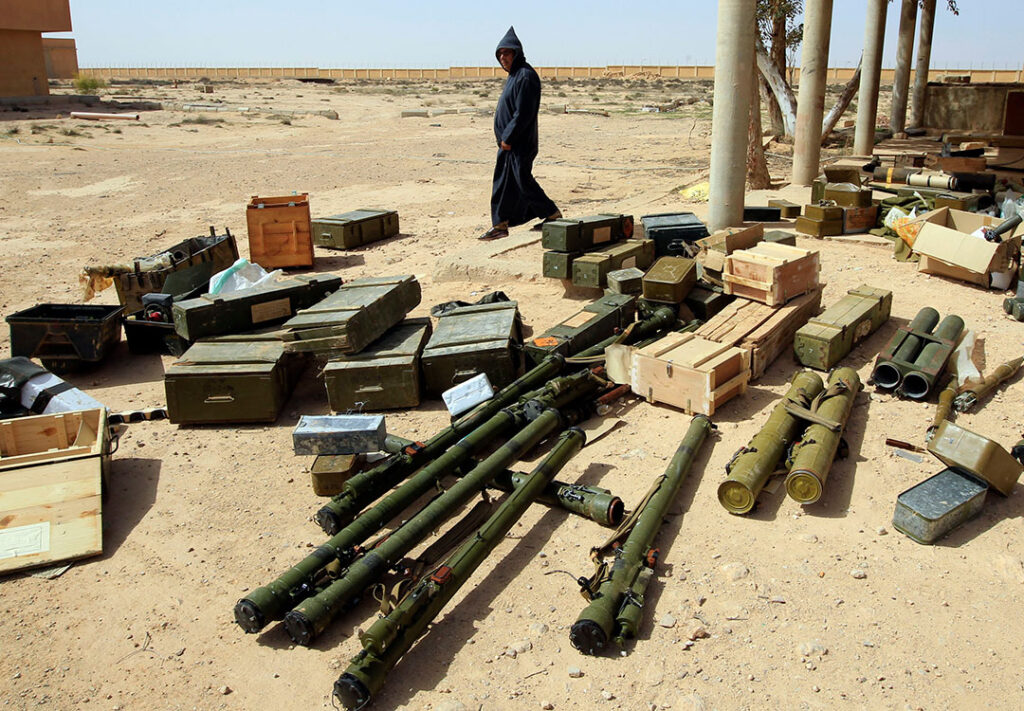ADF STAFF
The flow of arms into Sub-Saharan Africa is declining, and the role of longtime suppliers such as Russia and China has diminished as other actors enter the mix.
The Italian Institute for International Political Studies (ISPI) recently published a series of reports on this complex trend, based on data compiled by the Stockholm International Peace Research Institute (SIPRI).
The overall decline is due in part to economic constraints, changes in relations between Sub-Saharan countries and other nations, and supply chain issues related to Russia’s war with Ukraine.
Between 2014 and 2018, Russia and China were the largest exporters of arms to Sub-Saharan Africa, but the percentage of Russian arms exports to the region dropped 44% between 2019 and 2023, while China’s percentage fell 23% in that time frame, one ISPI report said. These countries remain the largest exporters of arms to the region, although China surpassed Russia as the leading supplier from 2019 to 2023.
Light weapons and armored vehicles are among the arms China exports to the region. However,
“
more advanced weapons technology, such as combat drones or warships are a key tool in Beijing’s military diplomacy as well,” Alessandro Arduino, a
ffiliate lecturer at the Lau China Institute at King’s College London, wrote in the ISPI series.
Arduino added that Beijing has restricted sales of its most advanced weaponry, allowing it to keep a military edge.
The decline of Russia’s exports is attributed to its invasion of Ukraine, according to Samuel Ramani,
associate fellow at the United Kingdom’s Royal United Services Institute.
Angola once was the largest African importer of Russian weapons, and i
n 2019 President João Lourenço approved the construction of factories to produce Russian weapons. But by 2022, Angola publicly sought to divest from its reliance on Russian weapons while seeking stronger ties with the United States.
“We, the government of Angola, would like to invite the U.S. to participate in our military equipment program,” Lourenço told Voice of America in December 2022. “As you know, until today, the Armed Forces of Angola [Forças Armadas Angolanas-FAA] have the so-called Soviet technique.”
As some countries move away from Russian arms imports, the Kremlin has continued making weapons sales to conflict zones.
After the outbreak of Sudan’s civil war, for example, Russia’s paramilitary Wagner Group funneled missiles to Gen. Mohamed Hamdan “Hemedti” Dagalo’s Rapid Support Forces. The Kremlin also is known to supply weapons to Mali and to Field Marshal Khalifa Haftar’s Libyan National Army.
With Chinese and Russian exports in decline, other countries, including Italy, the United Arab Emirates (UAE) and the U.S., have struck significant arms deals, especially with Nigeria, by far the region’s largest arms importer. These deals could significantly alter the dynamics of arms flow in the region.
From 2019 to 2023, Italy accounted for 4.9% of arms exports to the region. However, an order for 24 light combat aircraft by Nigeria, combined with smaller purchases by other countries, could make Italy the largest arms supplier to Nigeria and boost its ranking as an arms supplier to the region, according to Pieter Wezerman, senior researcher at SIPRI.
Nigeria’s arms imports from the U.S. also are set to increase with the delivery of 12 advanced combat helicopters over the next several years. This deal was made after the U.S. eased restrictions on arms imports to the country.
“The impact of this strategic move is poised to resonate across West Africa, setting the stage for a new chapter in defense collaboration and regional security dynamics,” the U.S. Defense Security Cooperation Agency said in a statement.
The UAE supports its African partners — particularly in East Africa — to gain access to resources and economic opportunities, and to preserve its reputation in areas where its companies have significant investments, according to Albert Vidal, a research analyst at the Institute for Security Studies.
The Streit Group, a privately owned Emirati armored vehicle manufacturer with a factory in Uganda, has supplied vehicles to the Democratic Republic of the Congo, Mali, Nigeria, South Sudan and Sudan. Another Emirati armored vehicle manufacturer has delivered its weapons to Chad, the DRC, Ethiopia, Mauritania, Mozambique, Rwanda and Sudan, Vidal wrote in the ISPI series.

